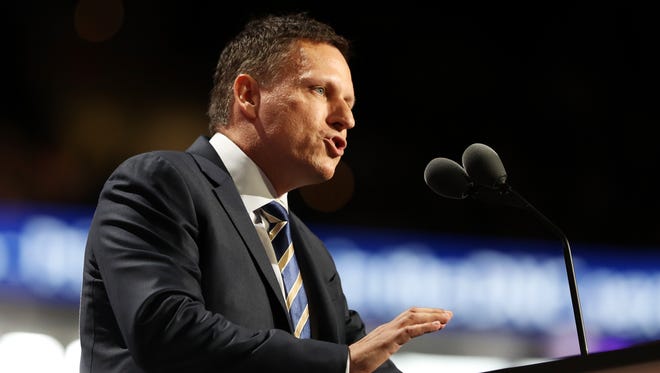Would Trump nominate Peter Thiel to Supreme Court?: Glenn Reynolds
The rumor doesn't appear to be true, but a Thiel-like nomination would bring diversity to the Court.

Last week I went to Washington, D.C. and attended the Cato Institute’s Constitution Day conference, where a host of distinguished speakers addressed a number of important topics. In addition, I spoke. My topic was the Supreme Court’s upcoming term.
I was assigned to discuss the Court’s coming term, which was harder than it sounds because, with Justice Scalia’s seat unfilled after over six months, the Court hasn’t taken very many cases. But, aside from the cases, there are a few other issues that this term raises.
One is the possibility that, if November’s election results wind up in front of the Supreme Court, Ruth Bader Ginsburg (known to her fans as “The Notorious RBG”) may have to recuse herself in light of comments she recently made about Donald Trump.
Ginsburg essentially said that she found the prospect of a Trump presidency unthinkable, and joked about moving to New Zealand. As The Washington Post noted, this has led many experts to draw parallels to an earlier case, when a Second Circuit judge compared President George W. Bush’s election to the elevation of Mussolini. The judge in question was formally admonished for that, and while Supreme Court Justices are not subject to such admonishment, experts cited by the Post said that Ginsburg would certainly have to recuse herself in any litigation over Trump’s election.
Ginsburg’s comments were injudicious, and though they are unlikely to become relevant in the coming term, should they in fact matter — because of a contested election, with the nation closely divided — her recusal, or worse, her refusal to recuse herself in such a case, would undoubtedly have explosive results, both for the nation and for the Court itself, an institution that depends on public regard and that has been growing less popular already in recent years. The comments are an iceberg that most likely will never meet its Titanic, but they’re worth noting because, should that meeting come to pass, the results would surely be the most significant event of the coming term.
We should elect Supreme Court justices: Glenn Reynolds
But how likely is that? It’s not like disputes over presidential elections ever wind up in front of the Supreme Court, and it’s not as if Donald Trump is the litigious type or anything. . . uh oh.
Meanwhile, should Trump win the election, there’s a rumor that he might choose as his first nominee Silicon Valley investor and billionaire Peter Thiel.
Thiel would bring diversity to the Court — Thiel, a graduate of Stanford Law School, would be the only member of the Court not from Harvard or Yale, and he’d also be the only openly gay member of the Court. More significantly, he’s a libertarian — there was lots of support for the idea of a Thiel appointment from the Cato crowd, which is also libertarian — and, unlike other justices, he would come to the Court with a degree of real-world experience unmatched by any appointee in my lifetime.
Alas, there’s not much evidence that the Thiel reports were actually, well, true. And Thiel may feel he has bigger fish to fry, what with his support for research aimed at ending aging and for space colonization. (There was some amusement among the Cato crowd at the notion of giving a lifetime appointment to a man who is actively funding research into immortality. . . .)
Kirsten Powers: What else is Clinton hiding?
POLICING THE USA: A look at race, justice, media
But I kind of wish it were true. Our Supreme Court nominees typically come from a pretty narrow cast: Harvard or Yale Law grads, academic credentials, a court of appeals background. There’s nothing wrong with people like that (heck, that’s basically my bio) but there’s a lot more to the country and the Constitution than is dreamt of by people with narrow Ivy League backgrounds.
The Thiel-appointment rumor may have been unfounded, but that’s too bad. I hope the next president will look beyond the usual suspects, and name someone with a real commitment to liberty and a background in the real world. There are people like that out there, if a president is willing to look for them. Will we get one next year? Stay tuned.
Glenn Harlan Reynolds, a University of Tennessee law professor and the author of The New School: How the Information Age Will Save American Education from Itself, is a member of USA TODAY's Board of Contributors.
You can read diverse opinions from our Board of Contributors and other writers on the Opinion front page, on Twitter @USATOpinion and in our daily Opinion newsletter. To respond to a column, submit a comment to letters@usatoday.com.